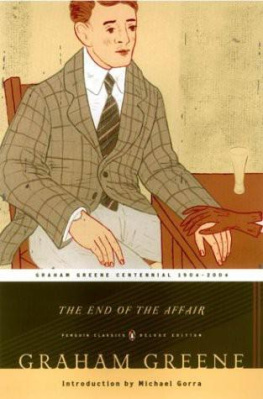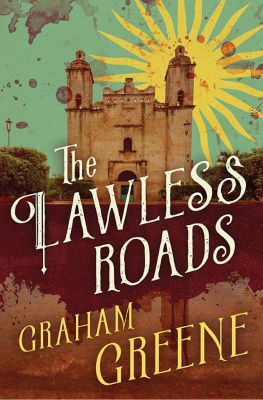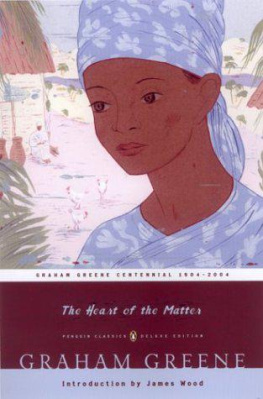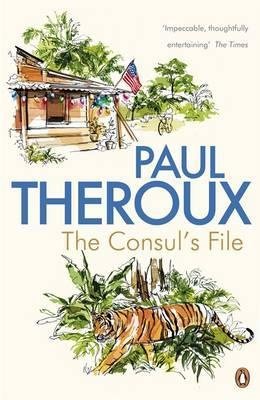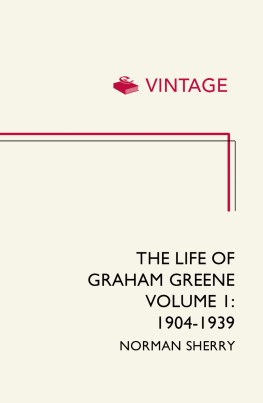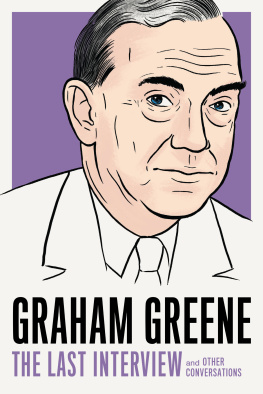
The Honorary Consul
Graham Greene
First published in 1974
Not one of the characters in this book is based on a living character, from the British Ambassador to the old man Jose. The province and the city in Argentina where the scene is principally set bear, of course, resemblance to a real city and a real province. I have left them nameless because I wished to take certain liberties and not to be tied down to the street plan of a particular city or the map of a particular province.
For Victoria Ocampo with love,
and in memory of the many happy weeks
I have passed at San Isidro
and Mar del Plata
All things merge in one anothergood into evil, generosity into justice, religion into politics ...
THOMAS HARDY
PART ONE
Doctor Eduardo Plarr stood in the small port on the Paran, among the rails and yellow cranes, watching where a horizontal plume of smoke stretched over the Chaco. It lay between the red bars of sunset like a stripe on a national flag. Doctor Plarr found himself alone at that hour except for the one sailor who was on guard outside the maritime building. It was an evening which, by some mysterious combination of failing light and the smell of an unrecognized plant, brings back to some men the sense of childhood and of future hope and to others the sense of something which has been lost and nearly forgotten.
The rails, the cranes, the maritime buildingthese had been what Doctor Plarr first saw of his adopted country. The years had changed nothing except by adding the line of smoke which when he arrived here first had not yet been hung out along the horizon on the far side of the Paran. The factory that produced it had not been built when he came down from the northern republic with his mother more than twenty years before on the weekly service from Paraguay. He remembered his father as he stood on the quay at Asuncin beside the short gangway of the small river boat, tall and gray and hollow-chested, and promised with a mechanical optimism that he would join them soon. In a monthor perhaps threehope creaked in his throat like a piece of rusty machinery.
It seemed in no way strange to the fourteen-year-old boy, though perhaps a little foreign, that his father kissed his wife on her forehead with a sort of reverence, as though she were a mother more than a bedmate. Doctor Plarr had considered himself in those days quite as Spanish as his mother, while his father was very noticeably English-born. His father belonged by right, and not simply by a passport, to the legendary island of snow and fog, the country of Dickens and of Conan Doyle, even though he had probably retained few genuine memories of the land he had left at the age of ten. A picture book, which had been bought for him at the last moment before embarkation by his parents, had survivedLondon Panoramaand Henry Plarr used often to turn over for his small son Eduardo the pages of flat gray photographs showing Buckingham Palace, the Tower of London, and a vista of Oxford Street filled with hansoms and horse-drawn cabs and ladies who clutched long skirts. His father, as Doctor Plarr realized much later, was an exile, and this was a continent of exilesof Italians, of Czechs, of Poles, of Welsh, of English. When Doctor Plarr as a boy read a novel of Dickens he read it as a foreigner might do, taking it all for contemporary truth for want of any other evidence, like a Russian who believes that the bailiff and the coffin-maker still follow their unchanged vocations in a world where Oliver Twist is somewhere imprisoned in a London cellar asking for more.
At fourteen he could not understand the motives which had made his father stay behind on the quay of the old capital on the river. It took more than a few years of life in Buenos Aires before he began to realize that the existence of an exile did not make for simplicityso many documents, so many visits to government offices. Simplicity belonged by right to those who were native-born, those who could take the conditions of life, however bizarre, for granted. The Spanish language was Roman by origin, and the Romans were a simple people. 'machismo'the sense of masculine pridewas the Spanish equivalent of virtus. It had little to do with English courage or a stiff upper lip. Perhaps his father in his foreign way was trying to imitate 'machismo' when he chose to face alone the daily increasing dangers on the other side of the Paraguayan border, but it was only the stiff lip which showed upon the quay.
The young Plarr and his mother reached the river port at almost this hour of the evening on their way to the great noisy capital of the republic in the south (their departure having been delayed some hours by a political demonstration), and something in the scenethe old colonial houses, a crumble of stucco in the street behind the waterfronttwo lovers embracing on a bencha moonstruck statue of a naked woman and the bust of an admiral with a homely Irish namethe electric light globes like great ripe fruit above a soft-drink standbecame lodged in the young Plarr's mind as a symbol of unaccustomed peace, so that, at long last, when he felt an urgent need to escape somewhere from the skyscrapers, the traffic blocks, the sirens of police cars and ambulances, the heroic statues of liberators on horseback, he chose to come back to this small northern city to work, with all the prestige of a qualified doctor from Buenos Aires. Not one of his friends in the capital or his coffeehouse acquaintances came near to understanding his motive: he would find a hot humid unhealthy climate in the north, they all assured him of that, and a town where nothing ever happened, not even violence.
"Perhaps it's unhealthy enough for me to build a better practice," he would reply with a smile which was quite as unmeaningor falseas his father's expression of hope.
In Buenos Aires, during the long years of separation, they had received one letter only from his father. It was addressed on the envelope to both of them, 'Seora e hijo'. The letter had not come through the post. They found it stuck under the door of their apartment on a Sunday evening about four years after their arrival when they returned from the cinema where they had watched 'Gone With the Wind' for the third time. His mother never missed a revival, perhaps because the old film and the old stars made civil war seem for a few hours something static and undangerous. Clark Gable and Vivien Leigh bobbed up again through the years in spite of all the bullets.
The envelope was very dirty and scrumpled and it was marked "By Hand," but they were never to learn by whose hand. It was not written on their old note-paper, which had been elegantly stamped in Gothic type with the name of the 'estancia', but on the lined leaves of a cheap notebook. The letter was full, as the voice on the quay had been, of pretended hope"things," his father wrote, were bound to settle down soon; it was undated, so perhaps the "hope" had been exhausted for a long time before the letter arrived. They never heard from his father again; not even a report or a rumor reached them either of his imprisonment or of his death. He had concluded the letter with Spanish formality, "It is my great comfort that the two whom I love best in the world are both in safety, your affectionate husband and father, Henry Plarr."
Doctor Plarr could not measure himself exactly how much he had been influenced to return to the small river port by the sense that here he would be living near the border of the country where he had been born and where his father was buriedwhether in a prison or a patch of ground he would probably never know. He had only to drive a few kilometers northeast and look across the curve of the river. He had only like the smugglers to take a canoe... He felt sometimes like a watchman waiting for a signal. There was of course a more immediate motive. Once to a mistress he had said, "I left Buenos Aires to get away as far as possible from my mother." It was true she had mislaid her beauty and become querulous over her lost 'estancia' as she lived on into middle age in the great sprawling muddled capital with its 'fantstica arquitectura' of skyscrapers in mean streets rising haphazardly and covered for twenty floors by Pepsi-Cola advertisements.
Next page

